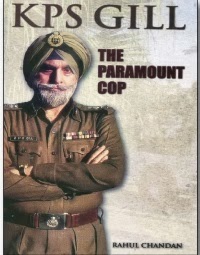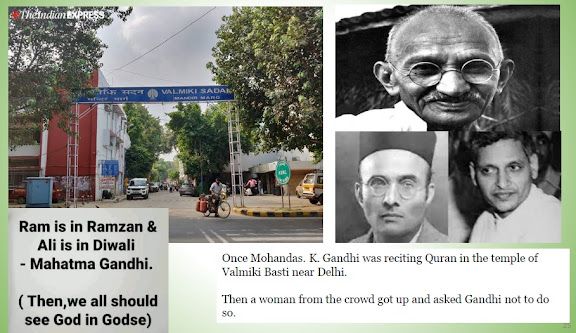Naarendra Modi as assessed by K.P.S. Gill
The observations here are the extracts from the biography book written by K.P.S.Gill titled: KPS Gill: The Paramount Cop.
Riots were at a peak in Gujarat; police was not able to control (the situation) and there were reports in the media that "The CM was ineffective for the challenge, or he simply lacked the will to stop this violence, or to say worse, he is himself, along with other BJP and VHP leaders, organising all these riots."
Riots were at a peak in Gujarat; police was not able to control (the situation) and there were reports in the media that "The CM was ineffective for the challenge, or he simply lacked the will to stop this violence, or to say worse, he is himself, along with other BJP and VHP leaders, organising all these riots."
Seeing
the sensitive situation and the negative publicity it was generating for the BJP,
L.K. Advani, the then Deputy Prime Minister and the Union Home
Minister, was busy finding ways to end that mayhem. The situation was confusing
since it was not becoming clear what the root cause of the problem was. Was it
Modi himself or the ineffective administration of Gujarat! Anyway, the first
priority of Advani was to end this violence at any cost...
It struck
Mr Advani that there was a man who was no more in active service but who was
never away from the service of the nation who could be trusted to bring peace
in Gujarat at that time. That was KPS Gill. So the only solution which seemed
plausible to the Union Government was the appointment of former DGP Punjab KPS
Gill as incharge of Police in Gujarat. But Gill was retired. Advani then came
to the conclusion that Gill should be requested to become Security
Advisor to Gujarat Chief Minister Narendra Modi...
Dr
Chandan Mitra met Mr Gill and broached the subject. On understanding the
proposal, Mr Gill expressed his willingness to undertake the assignment but had
one reservation. He said, "Chandan, you know I cannot be an armchair
theorist, what will I do, if I am not given any freedom to control the affairs?
What if my advice is not implemented? As a result Muslims will continue to get
killed and then, I will also be held responsible for the killing of innocent
people despite not having any power to stop it?" Mr Modi through Dr Mitra
assured Mr Gill that he would not interfere in his work and would provide him
all possible support to end the riots.
When news
spread that Gill would be joining as Advisor to CM Gujarat, his former boss and
former Punjab Police chief, J.F. Ribeiro, in his praise, said, "Gill can
solve the Gujarat problem in a week but he will have to arrest VHP members and
Muslim criminals. If Modi allows that, he will be signing his own death
warrant."
In the
first one to one meeting between Mr Gill and Mr Modi, what Mr Modi told Mr
Gill, expressed the sincerity which he had towards the whole episode which was
going on in Gujarat at that time.
Mr Modi
said, "Gill Sahib, we have been talking to each other through Mr Mitra or
Mr Advani but I want to request you now in person that I am not finding any
solution to this violence, I am not getting a fit police response which
could end the riots, I sought more force from the neighbouring States which
happen to be Congress-ruled States, but they refused. Media, opposition parties
and activists have launched a false anti-Modi campaign that I am behind all
these riots, which is not true. My first principle as a devout Hindu and as a
politician is 'Sarve Janah Sukhino Bhavanthu (May all the people in the world
be happy and peaceful).' I believe in this prayer and I start my day as a
politician with it. I have lot of faith in you, the country is indebted to you
for saving Punjab from going out of the Union. Without cops like you there can
be no democracies, there can be no political leaders and there can be no kings.
I will personally be thankful to you for my life if you can help ending this
mayhem at the earliest. The onus now is on you to fail me or make me successful
as a democratic leader."
Mr Gill
says, "After meeting Mr Modi, I was moved by his sincerity. I found him to
be fair and sincere in terms of his intention to end the riots. He seemed
worried and sad because his police had failed him in ending this violence; he
wanted me to take whatever steps I deemed fit to end this violence and assured
me whole-hearted support."
To make a
proper assessment of the situation, Mr Gill started touring all those places
which had witnessed communal riots. He listened in detail to the victims of
violence, the constables, the officers and the locals to assess where the
problem or the weakness lay. After a detailed assessment of the challenge which
lasted for one week, Gill says, "I found the police force unequal to the
challenge; majority of the policemen themselves had become communal in their
duty as they were enraged with the killings of so many kar sewaks (fellow
Hindus) at the hands of Muslims in Godhra. Similar was the condition of the
civil administration. Since Mr Modi had become the CM only a few months back,
the administration and the police force were not in his proper grip and it
takes time to develop such a grip when you are at such a top position. I found
that in the previous two months Mr Modi had made all efforts to stop riots, he
had called in the army with swiftness, he sought forces from the neighbouring
States and the Centre.
"I
realised that people of all political parties who were anti-Modi and anti-BJP
were taking advantage of this mayhem and making all efforts to defame Modi one
way or the other.
"The
so called dharam-nirpeksh (secular) parties were taking advantage of the fact
that Mr Modi follows the principles of Hindutva. They were portraying Hindutva
as something anti non-Hindu religions. My understanding was that Mr Modi's
practising of principles of Hindutva in no way meant that he would allow
killing people of other religions.
"An
American journalist asked me, What do you mean by Mr Modi's Hindutva?'
"I
said, 'In Christianity you have a Christian way of life, where some standard
norms have been laid out for Christians; similarly in Hinduism there is a Hindu
way of life where norms have been laid out for Hindus; but neither the former
nor the latter means anything against any religion.'
"Today
Gujarat is one of the best administered States not only for Hindus but for all
religions and all castes. The credit for this goes to only and only Mr
Modi."
Mr Gill's
assessment was that the problem which needed an immediate solution was to cut
this communal bug from the minds of the policemen and those who could not be
freed of this bug should not be allowed to sit in sensitive posts...
The first
step Gill took within three days of joining there was transferring all those
officers who failed to prevent the riots in their areas. Mr Gill interacted
with all those officers and based on his assessment of their competency and
intentions he got them transferred from sensitive posts. Those officers
expected to be fair in their working were given sensitive posts.
Mr Gill
says, "Mr Modi provided me full freedom to transfer those officers whom I
considered ineffective in terms of preventing violence as per their record of
the past few days. The kind of free hand Mr Modi gave me to apply my strategies
was given to me in Punjab by Sh. Beant Singh and through the pages of this book
I want to make it clear to one and all that Modi was never communal in his
conduct during this whole mayhem. He only conducted himself as an able
administrator, whether it was during my tenure as Security Advisor or before
it...
"My
observation is that when things like riots, terrorism, natural calamities, etc.
happen then sometimes the administration or the Government gets stupefied by
it. In those circumstances the administration is not able to find an
appropriate solution to the problem which leads to inordinate delays.
"This
delay is sometimes used by the opposition parties to tarnish the image of the
Government. Media also plays a negative role by being judgemental and
describing those false statements by the opposition leaders or other people who
are anti-Government, as facts. The allegations may be proved false later on but
this false propaganda created through media initially, goes a long way in
developing wrong perceptions about that Government or the leader and this
happened with Mr Modi in 2002. Moreover, the stupefaction was compounded by the
fact that Mr Modi was new to Chief Ministership.
"What
I feel is, the media should not only behave as a critic of the Government all
the times, they ought to sometimes understand the crisis situation for the
Government and act as a supporting arm to it, which unfortunately media failed
to do in 2002 vis-à-vis the Gujarat riots. From my first-hand experience of the
Gujarat situation I can say with conviction that the Gujarat riots were not the
failure of Mr Narendra Modi; instead it was the failure of the Gujarat Police
as well as the intentions of the Chief Ministers of the neighbouring States
which had then denied forces to Gujarat when the riots started."




Comments